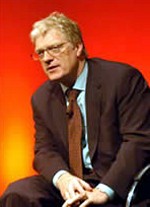XLSemanal. By Sir Ken Robinson, one of the world’s foremost experts in education (15/04/2012)
.
A lecture of 18 minutes in 2006 made him famous. “Schools kill creativity”, he said then in a revolutionary speech on education. Born in Liverpool in 1950, in the heart of a working family of seven brothers, the school changed his life. “A teacher saw the talent in a young lad poliomelítico neighborhood and went for him.” Professor, writer and lecturer, Robinson advises governments, companies and cultural institutions from all over the world.
First lie: if you strive in the cole, more you will have a good job. All the world’s countries are carrying out comprehensive education reforms. Something does not work, but no one can know very well what it is. For Robinson, the problem is that the old axiom “if you strive, you’ll be able to go to university and have a career and a good job assured,” has died. Already do not believe neither the teachers nor the children themselves. We educate the children with ideas of the past to an ever-changing world that we do not know.
Second lie: all those who fail are dumb. The main lines of the education system were conceived in the full Illustration, and are at the service of a expires industrial revolution. That’s why we continue to prioritize subjects such as math or science. According to Robinson, is followed by dividing the students into academic (or ready), and non-academic (or fools). That has “caused chaos”, many people are left out of the system because it is not bright, according to the yardstick of the Enlightenment. “The loss of talent is not deliberate, but it is systematic,” says Robinson.
Third lie: you must classify children by age. Schools are factories nor the students are products. That’s why censorship that children be classified by `date of manufacture, that is to say, for ages. “If we are interested in changing the educational model, we should not perpetuate a standardization characteristic of the industrial era. Education has to do with developing human beings, and human development is not linear”.
Fourth lie: the cole develops the intelligence in a holistic way. Divergent thinking is the capacity that the human being has to find a lot of possible answers to a single question. According to a study, 98 percent of children have that ability when they enter the nursery. However, years later (after passing through the educational system), the divergent thinking is waning dramatically. “Children grow up in a system that only allows them to handle a possible answer”.
Fifth lie: there is an epidemic of lack of attention. It is estimated that between five and ten percent of school-age children suffer from attention deficit. For Robinson, this diagnosis is so “wrong as fictitious”. And complaint that “it is a fashion health. The affected children are being medicated routinely”. He blames the lack of concentration to the over-stimulation caused by an excessive consumption of television, Internet, advertising, or video games. The educational system of all life fails to be of interest to students who have grown up in a different world.
Sixth lie:the solution is to demand less of students. The aim of the school should be to identify the natural skills and empower them. “I do not ask that is required to be less students, but more to the college”, he explains. To illustrate, Robinson always choose the example of geniuses such as Paul McCartney, George Harrison or Elvis Presley, to whom the school hung the poster of `zoquetes. Nobody was able to detect his gift for music or encourage it.
Seventh lie:intelligence is measured with a test. The test of intelligence, according to Robinson, are an invention supremacist. For him, the talent is something so personal and non-transferable as a fingerprint. The key is how you are smart; not if you are.
And a conclusion: discover your element! The equation, according to Robinson, is simple: “talent plus passion equals success”. The trick is to discover what it is. In this process, parents play a key role. They must recognize those natural abilities of children and empower them to bloom.
——————————————-


